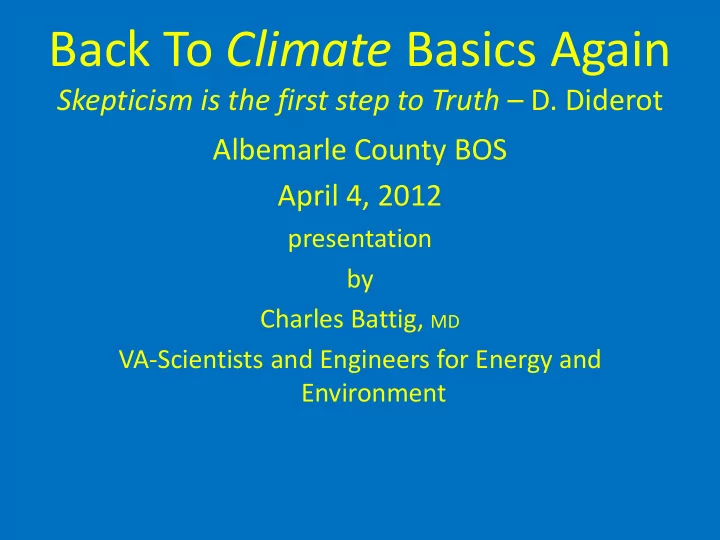

Back To Climate Basics Again Skepticism is the first step to Truth – D. Diderot Albemarle County BOS April 4, 2012 presentation by Charles Battig, MD VA-Scientists and Engineers for Energy and Environment
UVA: Why Quote CO2 Levels Back To Only A Few Thousand Years? CO2 Has Been Much Higher 4000ppm 390ppm Today Then
50 Million Years Of Cooling
Last 10,000 Years Ice Core Data We Are Cooling
High variability of Greenland surface temperature over the past 4000 years estimated from trapped air in an ice core. Geophysical Research Letters 38 : 10.1029/2011GL049444 . • "there was another similarly warm period (-29.7°C) in the 1140s (Medieval Warm Period), indicating that the present decade is not outside the envelope of variability of the last 1000 years.” • "during two intervals (~1300 BP and ~3360 BP) centennial average temperatures were nearly 1.0°C warmer (-28.9° C) than the present decade.“ • Conclusion: It has been warmer in Greenland before the presence of current levels of man- made CO2
Antarctic Ice Core Data 4,000 Plus Years Of Cooling
Arctic Sea Ice Extent March 2012 Is High Average (2005-2012) Danish Meteorological Institute – Centre for Ocean and Ice
What Is The Question? • The original question posed by the U.N. Intergovernmental Panel on Climate Change (IPCC) 1988…Has man -made carbon dioxide made a measurable, and identifiable impact on global warming? Later changed to climate change; now “global weirding” • The IPCC is not a research organization; it is a politically driven agency which assumed from the start that CO2 was the primary driver of climate
What Is The Answer To Date? • Computer models designed to answer this basic question have failed when compared to the real world, historical record • Climate computer models fail the test of prediction, especially at the regional scale • The sought-for, man-made climate component is very small, buried amongst the effects of variable atmospheric aerosols, poorly- understood cloud feedback mechanisms, and various solar influences
Chesapeake Bay, VA Has A Problem, Just Don’t Blame It All On Climate/CO2/Sea Level
2012: Baseline 12-Inches-Per-100-Years Global Sea Level Rise Stalled
Once Upon A Time…35 Million Years Ago, A Meteor Followed By An Ice Age Chesapeake Bay Land Subsidence and Sea Level Change” VIMS report, J. Boon, November 2010
Virginia Institute Of Marine Science December 17, 2010 Press Release Study authors Dr. J. Boon and Professor J. Brubaker report that: • “absolute sea level in Chesapeake Bay is rising only about half as fast as the global average rise rate.” • The authors conclude “While relative sea level continues to rise at some of the highest rates found along the U.S. Atlantic Coast, there is presently no evidence of a statistically significant increase marking an acceleration in relative sea-level rise ” at any of the 5 Bay stations measured
A One Hundred Year Record Of Chesapeake Bay Area: A Stable Sea Level Rise Of 1.25 Feet/100 Years NOAA – National Oceanic and Atmospheric Administration
VIMS Report December 17, 2010 Dr. John Boon, the study’s lead author, says that: Data from NOAA satellites and tide gauges show that absolute sea level is rising at a rate of about 1.8 millimeters per year in Chesapeake Bay. That’s only about half of the globally averaged 3.1-mm per year rate of absolute sea-level rise, as reported by the U.N. IPCC
ABCs of Land-Ocean Interactions • Isostatic Sea Level : defined as relative sea level changes resulting from the local interaction of land rise or fall and the reference sea level • Chesapeake Bay area has had low absolute sea level change/rise, but significant land sinking
In Closing Q.E.D.
Recommend
More recommend